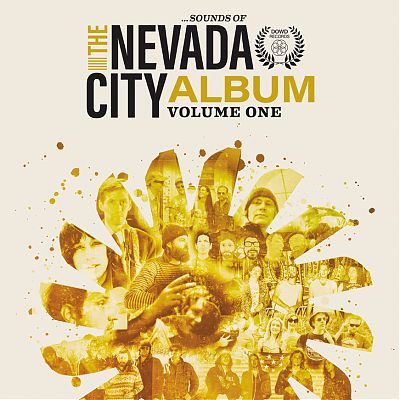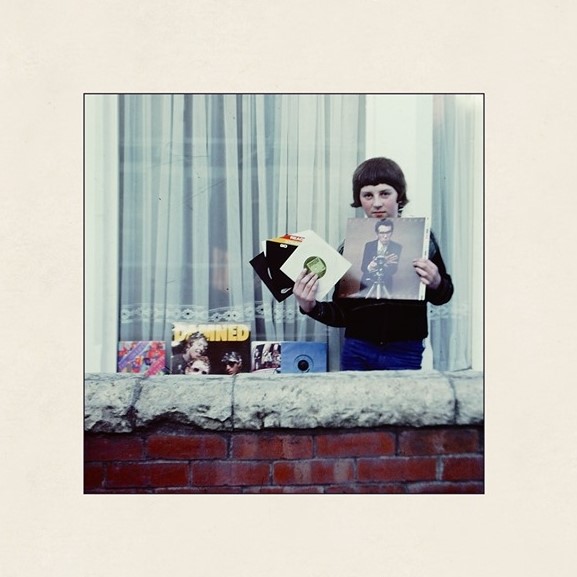
the nevada city album
Welcome to Nevada City. The small town is infused with musical talent across several genres, and it’s all showcased on The Nevada City Album, a compilation put out by Dowd Records in celebration of the Nevada City Film Festival. As we come across each artist featured on the album, we can trace a progression of genre from mood music to courageous hard rock.
Our first stop is Brett Shady, a folk singer who describes his music on twitter as easy listening. His track “Dear Life” is a swaying waltz that endears all who it flutters by with Shady’s uncomplicated voice and some whimsical sax playing. Things get a little psychedelic with Aaron Ross farther along the album, with his own personal brand of freak folk in his song “Painted Sky.” Its endless and dreamy guitar riff, bejeweled synth melodies and odd backing vocals certainly paint an interesting sky– one that Lucy and Sgt. Pepper could gaze upon together. These indie tracks are echoed by “Peaks and Passes”, a fleeting gem on the album gifted to us by The Moore Brothers. A blues guitar riff and harmonies reminiscent of doo-wop or even gospel music make for an eclectic sound that shows how extensive the influences are around Nevada City. But we have only scratched the surface of the cavernous pool of genres on this compilation.
“Coming Down” by Jessica Lynn and Broken Spoke and “Heart on Fire” by Farrow and the Peach Leaves both rock a country/americana sound, with classic country vocals and roots-oriented guitar. “Heart on Fire” has a hint of happy-go-lucky energy to it, while “Coming Down” layers in some twangy guitar for a more western sound. Soon enough, however, the clouds roll in and that western sound darkens for Tiera May’s “Ballad of the Damned.” Her moody psych rock comes from rumbling guitars, atmospheric cymbal rolls and May’s apparition-like vocals that writhe through the air like the wails of a ghost. Less spectral but just as moody, the alt-rock track “400 Degrees” by Casual Fog uses slow, gloomy guitars and a rising bassline to create a perpetual, inevitable demeanour that carries you along with it.
Speaking of rock music, this compilation is an ecosystem of the genre, with diverse species that work together to cultivate an interesting and fruitful environment. First we travel back in time to the 80’s with “Hungry for the Dark,” by TLA, another alternative rock tune with lots of influence from punk and new wave. Its drum machine, prominent synth bassline and embellishments and the robotic lead vocals make you nostalgic for the post-punk era, no matter what year you were born in. Dipping into some electronica, “Lrn2love” by The Fit transports us to another planet entirely, with its glitching, cybernetic music and computerized vocals. The celestial rock bop “In Gratitude” by Shapes Freely, on the other hand, exists suspended in space. Its gentle vocals, orbiting synths and strings paint a vivid soundscape from outer space complete with stars, planets, rocket ships, and even extraterrestrial beings. On our way back down again, we meet “The Bad One” by Mount Whateverest, or, ‘the highest band on earth.’ This track is a product of what the band calls “solar powered fuzz and roll,” complete with slow, disjunct, infectious beats and a variety of vocals with different effects. Mount Whateverest utilizes whatever they can from saccharine pop melodies to big classic rock riffs to reach new heights with their music.
Finally, we reach the antipode of the easy, calm sound of “Dear Life” with the hard rock tracks “Killed Alive” by Cherry Rats and “Beverly Hills” by Beautiful Dudes. The former’s crashing drums and vigorous distorted guitar provide you with a taste of 2020 style classic rock. The Dudes are known for their cathartic hard rock sound and catchy hooks, and “Beverly Hills” certainly delivers, sounding grungy but upbeat in a vaguely Weezer-like way.
The Nevada City Album sought a varied and gifted assortment of artists in the area, scooped them up and unified them in a multifaceted compilation that has something for everyone. It’s well worth listening to, for when you find yourself drawn to some of the musicians, you know exactly where to look for live shows!

the sea the sea, stumbling home
by: katy mombourquette
It’s a long life, made up of seemingly infinitesimal moments. The Sea The Sea captures those moments when you feel incredibly alive and in the world and reimagines them as flashes of light in their new album, Stumbling Home. When time seems to stretch into prolonged chaos, The Sea The Sea keeps us grounded in the essential with their beautifully intricate brand of indie folk-pop. The New York-based duo is composed of Chuck and Mira Costa, who draw their infectious melodies from pop, but otherwise subverts expectations with their unconventional song arrangements. More than anything else, however, this free-spirited pairing are lauded for their exemplary vocal harmonies. The Costas’ exquisite vocals fit together like puzzle pieces tailor-made for the duo. Their voices are completely authentic, sounding lovely and unblemished in their own right. But while duets are a key part of The Sea The Sea’s sound, they also play with thick choral-textured harmonies and solo lines to add some variance among the tracks while still maintaining their sound.
Stumbling Home is brimming with musical imagery that is at times delicate and at other times deep and rustic. The result is glimpses of life, as seen through nature and a little bit of magic. The opening track, “Nothing Brighter” sounds like light, with the glint of sunlight on a clear day in the understated woodwind flourishes, and the glowing bass and piano as the blurry hues of a sunset. The relaxed, tranquil guitar solo sounds like it’s underwater, painting images of rays of light extending down beneath the surface. “A Thousand Years” is more concrete, sounding like the musical equivalent of camping beneath a starry sky. The rich guitar picking and embellishments are the flickers of the fire as they rise above and become stars overhead. The track embodies the deeply rooted tranquility that comes from being removed from society, as felt in the gentle thump of the drum in the stunning interlude partway through the song. Other images are abstract, such as in “Rainstorm.” While there are no explicit qualities in the track that denote a storm, as a whole, it has this somber beauty to it that echoes that of the fall of rain and thundering clouds.
In literature and art, however, one can always find magic embedded within nature. The Sea The Sea captures this magic in their songs with sparing uses of synth and electric guitar. The chorus of the emotional “Broken” sweeps up in a satisfying multi-part harmony and ends with glimmering drops of guitar plucks. Towards the end, these drops lead the song to the pleasantly haunting outro “oohs,” transforming the sound from sparkling fairy dust to mystic beings deep within the forest. “Fall Before The Climb” starts with a simple voice and guitar, but builds, first with harmony, then with a gently driven beat and dulcet electric tones that return to the shimmering stars of “A Thousand Years”, but from the perspective of outer space rather than earth. The acute line “Can we be in love with it all?” summarizes the album as a whole, mirroring the idea of the moments in life when you feel alive and in tune with the world. Uncomplicated guitar strums and the Costas’ patented vocals showcase guitar and synth sorcery in “Stumbling Home.” Bowed strings make their appearance for the first time in this track. Despite how well they fit, the strings are a bit of a surprise, giving “Stumbling Home” a bit of refinement compared to the other, more rustic tracks. Subtle but welcome changes like this find their way into many songs on Stumbling Home. “Parachute” sounds like you would expect after hearing a few songs on this album, except Chuck’s harmony is missing. Instead, Mira backs herself with echoes and a feathery multi-part harmony that sound like forest nymphs. The track also feels more intimate than the others, beginning with some room noise and ending with an ambiguous woosh sound that keeps the listener tethered to the real world. The standout track “Real Thing” realizes a slightly harder, rock sound with a bit of sharp guitar strums and stronger drum beat. Every guitar, synth melody, and percussion part contributes to the full sound, and the universally appealing chorus line “ahh, give me that real thing” has that cathartic nature to it that makes this track one to sing along to. I only wish it were longer; every time I listen to it I’m disappointed when it reaches its end. “I’ll Be Loving You” and “Foreign Country” share an understated mesmerizing quality. “I’ll Be Loving You” and its 6/8 time creates this swaying nature that’s perfect for a love song. Spirited triplet guitar figures simultaneously embrace the vocals and the listener, coaxing both to sink into serenity. “Foreign Country” has substantial guitar, but the line “Do we ever really know exactly where we are?” floats across the background like falling leaves, and the perpetual beat invites the listener to snap along, almost in a trance.
The Sea The Sea’s 2014 debut release, Love We Are We Love, received praise from NPR, American Songwriter, and No Depression. The video for their song “Waiting” sparked the interest of Buzzfeed and Pitchfork, and was included at the international TED 2015 conference. But for the duo, Stumbling Home reaches a new level of fulfillment. “It’s the work we are most proud of to date,” shares Mira. “We are proud of the way we grew the arrangements in our new creative space. Making music fills us, and we also believe that it matters in the world. Our mission statement as a band is to remind people they aren’t alone — in their pains or their joys, and everything in-between.” This shrewd sense of the world, both what it seems to be and what it is, allows Stumbling Home to be a beacon of light in an otherwise ill-lit world.

caitlin pasko, greenhouse
by katy mombourquette
In an effort to work through the trauma of a psychologically abusive relationship, Caitlin Pasko offers Greenhouse: nine hauntingly pensive songs that aim to heal the self and move on from past wounds. A greenhouse is a structure that protects plant life from unfavourable external conditions, and in the same way Greenhouse provides a safe space for Pasko’s songs to grow and flourish into understanding and acceptance. The album is deeply involved with the concept of space– both in a metaphorical sense with its title, but also in terms of its sonic atmosphere. All the songs exist suspended in space, and silence works hand-in-hand with language to provide room for Pasko’s thoughts to form and evolve. “Ooo Happy”, a fleeting and chilling mid-album interlude has fourteen seconds of silence at the end before moving on. There are no words in this silence, and yet it speaks volumes. Much of Pasko’s gentle and breathy vocals on this album are delicately supported by sparse accompaniment, but each line carries so much weight. The accompaniment sometimes comes in the form of electronic atmospheres or decorative plucked strings, but most often in the form of ambient piano playing. Pasko’s compositions fully explore the tension between dynamics, tempo, and space, reminding one of Satie or Debussy. Her songs feel liberated from tempo, as her vocals and elegant piano melodies freely move like fantasias. In “Unwell”, the placement of each word and each chord is liberated from any sort of beat, but at the same time is deliberate and effective.
“Unwell” is also the first of a trio of songs on Greenhouse, manifested from Pasko’s walks through Brooklyn in 2017. During these walks she experienced dissociation– a kind of out-of-body sensation where she felt like she was floating above herself, viewing herself from a different point of view. Pasko channels this idea of multiple points of views in “Unwell”, “Mother”, and “Even God.” She crafts parallels in her lyrics between songs, such as when she talks about walking a neighbourhood that isn’t hers in “Unwell” and then sings “Today I remembered what it feels like to go walking on the sidewalk in the city that’s not my city” in “Mother”, the lyrics in both songs spilling over one another, feeling like a wandering thought. “Mother” plays with perspective as well, towards the end she sings “She’s my daughter, I’m her sister, she’s my sister, I’m her mother, she’s my mother” and delves into the idea of becoming a mother herself, with a second voice joining her in harmony when she talks about creative another life. “Even God” is written from the perspective of Pasko’s own mother and recalls Greenhouse’s inspiration: an abusive relationship. “Even God” is about being trauma-bonded to an abusive partner, with the principal lyric “Even God is selfish” playing with the idea that “nobody’s perfect.” About the song, Pasko says “‘You can sleep in / just make the bed’ is me saying, ‘I will put up with these bouts of cruelty, because I know you love me.’ It’s dark. I was sick. I was twisting the truth in order to cope with my reality, and as I started to believe my non-truth, I also turned against my friends who wanted to help me. If I believed them, then I’d have to admit to my own hell.”
So while “Even God” is about Pasko’s relationship with her partner, it’s also about how her situation affected her relationship with her friends, and even herself. Greenhouse documents the dissolution of relationships, romantic, platonic, and familial, all the while developing her ever-evolving connection to herself. “I Know I” uses two part harmony to represent Pasko’s child self and her inner mother, and how they communicate. The lower harmony briefly becomes the lead in the middle of the song, but soon enough returns to its original role, functioning as a metaphor for the conversations that take place between the mind and the heart. We hear this metaphorical harmony in “Mother” as well, when Pasko mulls over the possibility of motherhood for herself. At times, the album highlights relationships in the form of a dichotomy, such as in “Horrible Person.” The deeply reflective nature of the track contradicts its themes of self-abandonment and toxic enmeshment. Therefore, the “horrible person” is not only the abuser, but also the self as seen through someone else’s distorted, narcissistic mirror. Pasko composed the track a cappella, alone in her bed, in the dark, in an attempt to develop a reclamation of personal agency. It became the album’s centerpiece, and uses electronic sounds to create tension but also to depict an underwater chasm. Flickers of sound represent neon diatoms that dart around Pasko, eventually overtaking her right before the song ends in a deafening silence.
“Horrible Person” highlights how an abusive relationship can have reverberations in other parts of someone’s life, and when it’s over you have to remedy that. But a part of healing is confronting what happened and believing one’s own survival story. Pasko rewrites the narrative surrounding her experience in “Quiet Weather” and “To The Leaves.” In “Quiet Weather”, Pasko uses metaphors for herself and her partner to evoke imagery of a lake with still waters, showing her sense of lyrical craftsmanship. She attempts to exhume the past to allow herself to move on, singing “When I think of you I take a shovel to my chest and dig as deep as I can get.” “To The Leaves” is an artistic wonder that stitches together fragmented versions of the self in order to regain a sense of personal identity. With the words “It’s hard to believe that I was ever a peach in the leaves / It’s hard to believe that I was ever that version of me,” Pasko calls to attention how a survivor may gaslight herself into not believing her own experience. The piano gently plays haunting suspended chords that send a shiver down your spine.
The effective chords in “To The Leaves” create one of the scarce moments in the album that evokes emotion. Greenhouse is not emotional, it’s passive and composed. Yet it isn’t devoid of feeling. It’s a document; her words and experiences speak for themselves. In the moments where the piano chords deepen or electronic static takes over the space, they only emphasize the already implicit feelings. We hear this in the closing track, “Intimate Distance,” in which Pasko sings to herself as an act of atonement. The opening piano is unsentimental, but as the song progresses it deepens, at times feeling somber but at other times feeling powerful and majestic. “Intimate Distance” is the final step to moving on for Pasko, she clarifies and makes peace with the pain and love that lie beneath her trauma.
Greenhouse is intricate, intellectual, and complex. But so is the path to healing. By the time we get to “Intimate Distance”, we have seen Pasko face her damage from the past, engage with the possibilities of her future, and deal with all of the complications along the way. Her words are utterly beautiful, and packed with exquisite veiled meaning that would take many listens to fully grasp. From its title to its reserved demeanour that is subtly interwoven with emotion, Greenhouse is an understated work of art that needs to be listened to with willing ears and an open heart.

brontë fall, finishing school
by: katy mombourquette
Today, the deeply relevant EP Finishing School was released by Brontë Fall. The literature-infused pen name is the songwriting project of classically trained musician Teri Bracken, who is ever inspired by the Brontë sisters and their courageous defiance of social norms at a time when women’s voices often went unheard. After coming across Emily Brontë’s poem “Fall Leaves Fall”, Bracken fell in love with the idea of finding beauty in the darker seasons of life. In her own life and music, Bracken embodies the spirit of this poem and the Brontë sisters with an openness and eloquence that firmly impresses her messages in her listeners’ minds. Most of all, Bracken wants to use her art to empower those around her and to connect with those who can identify with her experiences. She says:
As a musician, I almost feel like I’m defending who I am and what I want. Perhaps I feel pressure to be a certain way. These songs were written about feeling proud of where I am and what I’m doing. It’s about feeling empowered wherever you are in life, and celebrating the past while building your own kind of future.
Bracken attacks her issues from different places, opting for a tougher sound in “Warrior”, “Bad Ideas”, and “White Dress”, but also showing her softer side in “Six Years”, “Freeway High”, and “Give You A Halo.” No matter her musical approach, however, her words show her courage and boldness to say what she has to say. Finishing School is packed with empowering anthems, sometimes punchy, sometimes subtle, but all with catchy choruses that use repeated words and melodic lines to drive her points home. Each track deals with a female experience, entertaining and inspiring her listeners along the way.
“Six Years” is a celebration of aging contrary to the praise put on the youthfulness of women in today’s world. Bracken’s voice isn’t loud or confrontational as she sings, but rather it assumes a calmness that comes from a place of complete honesty. Yet at the same time, her voice could fill an entire room, ringing out full and glorious. The track slowly builds, with drums and the bulk of the music only coming in in the second verse, giving it its anthemic quality as Bracken sings “I’m six older, six years smarter, six years stronger with a will that’s unbreakable.” “Freeway High” is all about liberation and letting go. On the surface, this liberation is symbolized in the freedom of an open road but, on a deeper level, it calls to mind the freedom that the Brontë sisters and Bracken herself were (and still are) fighting for. The track has a bit of a country sound, drawing the line between Bracken’s pop and rock influences. Her soaring vocals rise straight to heaven where they’re greeted by angelic harmonies, while a solo violin part adopts its own sense of liberty as it freely moves through notes. In a heartbreakingly tender but equally powerful ballad, “Give You A Halo”, Bracken sings of someone she’s afraid of losing, written for her Grandma. It begins with a ¾ time piano part that reminds one of a black and white scene of a Parisian street in a melancholic french film, setting the sentimental mood for the track. Strings slowly join in, exploring soul-stirring deep ranges that fortify her words. As Bracken sings “Oh late at night I try to call on you without tears in my eyes… but I’m not ready to give you a halo,” with such an earnest conviction, you can’t help but to feel your own heartbreak.
While all of these tracks are similarly calm with a subtle sense of empowerment to them, Bracken is far from one-dimensional, and the remaining three tracks on Finishing School show it. “Warrior” is tough with its electric guitar and blues-rock singing style. Dealing with the fight against misogyny in business and the music industry, this track is a swaggering anthem that uses a piece of wisdom from Donatella Versace (“A dress is a weapon”) to depict femininity as an arsenal. From her voice to her words, Bracken is unapologetic and badass, singing “go ahead and call me a tease, I don’t wear my heart on my sleeve.” “Bad Ideas” has a darker sound to it, with low-range underlying harmonies and short string strokes that add a sense of drama. The song points out how complicated life can be, wanting to “unbreak” someone’s heart even though it’s a bad idea. To close off the EP, “White Dress” returns to the spunky energy of “Warrior” but in an old-fashioned way– using an organ and a bluesy sound that feels somewhat ironic set against her modern feminist words. About the constant pressure to get married, Bracken defies expectations and sings “it may not look like the rest, this is my white dress,” showing that she can find fulfillment outside of marriage.
This closing track brings us right back to the core of the album: honesty. Bracken is channelling the Brontë sisters and their feminism to provide an EP that not only speaks her truth about the expectations that persist for women even today but also gives validation to anyone out there who wants to break free of those expectations. Finishing School may cross into different genres and explore varied musical elements, but each song is unified by Bracken’s expressive voice, and most importantly, her beautiful and pertinent words.

david newton & thee mighty angels, a gateway to a lifetime of disappointment
It has been nine years since David Newton & Thee Mighty Angels released the debut EP, Paint the Town, so there’s no better time than now to release a debut album. A Gateway to a Lifetime of Disappointment is Newton’s debut solo album and a modern contemporary take on the melodic uplifting side of the 80’s post-punk sound. He continues the earlier sounds from his band, The Mighty Lemon Drops, where he wrote songs and played guitar. After the release of Paint the Town, Newton focused on producing and engineering for other artists at his Los Angeles recording studio.
A Gateway to a Lifetime of Disappointment is written, performed, recorded and mixed by David Newton. The first single, “The Songs That Changed Our Lives”, features lead vocals by Eddie Argos from Art Brut. It lists Argos and Newton’s favorite tracks growing up that had an impact on them, accompanied by a video of well-worn 7” singles. With a mix of new and old songs from the previous EP, they flow together and represent the vision Newton had been chasing. “In Love and War” starts off on the right foot, an upbeat pop track to tease the rest of the album. The introduction of “The Kids Are Not Alright” draws you in and repeats through the background of the track. The themes of the tracks chronicle the joys and disappointments of what life can throw at us. “Avoid It” warns to stay clear of anything that will make you crash and burn. The track is somehow similar to the sound of Pink Floyd, but more upbeat.
The album is a prime example of the variety in Newton repertoire, mixing genres and stepping outside of the box with lyrics. “My First Band” and “Paint the Town” fit between the styles of indie-rock and pop. Although Newton took on most of the work on this record, he did have help from other musicians. “Bittersweet” features Sarah Negahdari on vocals and Nick Amoroso on drums, adding some flair to the track. The shortest and sweetest track, “This Time”, is all about happiness and love. Listening to it you can feel the emotion behind his voice, making it the most sincere on the album. Similarly, “Connect With You” has an almost giddy feeling to it, connecting you to Newton. A Gateway to a Lifetime of Disappointment is the return from David Newton & Thee Mighty Angels the world needed.

kandle, stick around and find out
By: Leigha Stuiso
Singer-songwriter Kandle (Kandle Osborne) found herself recording her latest release Stick Around and Find Out during lockdown. But you know what they say; extraordinary circumstances call for extraordinary music. Okay maybe that isn’t what they say, but in this case, it is true. The Canadian artist was focused on her vision for Stick Around and Find Out and the result is a great addition to her work. The varying sounds through the tracks fit together just right for a solid EP.
Osborne went through a journey to get where she is today, all while reclaiming her sound. According to her recent Instagram post, each song was recorded in a different city by a different producer and each was written in one day. On “Spell”, there is a story behind the catchy lyrics. It is about falling for someone and giving them all the power, like there is a spell controlling and pulling her back in. Continuing on this journey, Osborne finds herself helpless on “How Can You Hurt Me”. Not only are the lyrics relatable, but the music behind the lyrics can pull you in all by itself. The smooth production behind the tracks puts the songs on another level that will have you dancing along in your room. “Just To Bring You Back” is one of the more upbeat tracks in the collection. It sounds funky and somehow spooky, feeling like it would be the perfect music for a Halloween party on a show like Euphoria.
“Better Man” finds Osborne in control of her music after being tangled in recording contracts. Produced by Ben Simonetti (Zac Brown Band) and Liam O’Neill (Kings of Leon) in Nashville, the track is probably the most personal and freeing track after being stuck in such a difficult situation. Osborne said on the track, “I signed away my freedom. I wasn’t allowed to perform or release music or do anything, consequently, my career was put on hold for years. I was taken in the prime of my career and was stopped — my music was lost. Four years later, I started my battle for freedom.” Now that she can create songs like “Little Bad Things” and “Cemetery”, where her smokey vocals flow freely through her creative lyrics, she is thriving. Even with her final track, “Happy Pills”, she continues with clever lyrics and unique sound. The lyrics, “One to keep me calm / two to stop the pain / three to right my wrongs / and four…”, echo around the mind long after listening to the track.
After all that Osborne has been through, she is now at the top of her game. Her songs are cathartic, but at the same time seem to focus on empowerment and looking towards the future. This EP is only the beginning of her talents and she is bound to take off and become a big name in the industry. The charm shines through the music and her talent is undeniable, as she writes her own personal experiences instead of aiming for cookie-cutter radio tracks. Stream Stick Around and Find Out now.

jono dorr, the unexamined life part 1
Jono Dorr, a prolific songwriter and producer, has released his 6 part project, titled The Unexamined Life Part 1. Dorr has helped to launch and sustain the career of noteworthy artists such as Hayley Kiyoko, and has worked with Kehlani, The Neighbourhood, and Gnash. Hailing from Los Angeles, Dorr grew up playing bass and guitar in various bands, primarily exploring classic rock, blues, and funk. In high school and university, he began to develop his production skills. The opportunity to create electronic music at an early age allowed him to hone his ability to a finely sharpened point which he now uses to precisely pioneer a soulful revival within the modern pop landscape. The Unexamined Life Part 1 is an eclectic piece of work that is equal parts haunting, delicate, and devastating. Dorr explains, “The Unexamined Life Part 1 is about choosing pain over ignorance, freedom over obedience, and purpose over greed. Each song focuses on different moments in my life that compelled me to look inward for answers.” With each moment comes a wide range of emotions that make the EP accessible to anyone who is looking to relate to something.
Right away, “High Tide” introduces you to Dorr’s “soulful revival.” His use of gospel-like harmony is sparing and thoughtful. The dynamic interplay between his solo vocal lines and the harmonically supported lines creates a grand, dramatic overall sound, but the underlying dance beat invites the listener to get on their feet as well. Dorr’s vaguely Avicii-sounding voice glides through melodies that are incredibly singable, so don’t be surprised if you find yourself singing along.
“Envy The Man” briefly sounds like a ballad, with simple piano chords and a slow tempo, but soon understated elements come in– a beat, soft electronic chords– until the chorus hits with a mélange of surprising sounds that flow together in completely disjunct harmony. Bubbly notes, phasing chords, explicit beats, and resounding background voices that sound like part of the instrumental fabric themselves are a testament to Dorr’s exceptional production skills, making it the standout track on the EP.
“Quiet Footsteps” is slow, vengeful, and faintly menacing. It begins with some jazzy piano that struggles to ring out amidst a windswept background, while incessant cymbal attacks keep a slow but resolute beat. Dorr sings “I can’t escape,” and the words rebound, as though they themselves are trapped. Soon after, an extremely distorted guitar solo torments its way through the dark atmosphere. But then things change and the clouds part as the gospel harmonies of “High Tide” return. The hopeful sound of their unified voices are surprisingly uplifting compared to the rest of the song, adding an intriguing twist. As the music and then voices fade away and the song reaches its end, it feels somewhat removed– as though you’re floating away.
The picture of distortion and obscurity that “Quiet Footsteps” paints is focused into something that is infinitely more intimate in “Wanna Stay.” Raindrops and gentle acoustic guitar picking make you feel so much closer to Dorr and the aching tenderness that his words and music unveil. Again, Dorr’s experience with production shines through, with each electronic touch completely free of edge– fitting beautifully with the natural sound of the acoustic guitar. Soulful harmonies subtly support Dorr’s voice, especially on the word “stay,” the most important word in the track.
But the cozy enclosure that “Wanna Stay” seems to exist within is shattered by the next track, “07 Child.” You’re transported into a dark, dusky alleyway with a foreboding chill creeping its way into your body. Voices meander about in the style of Gregorian chant, a guitar relentlessly plays a static interval, solemn “mmm’s” embed themselves into the framework, and three unsettlingly tangible knocks ring out in an all-too-real fashion. When Dorr comes in, he sings “stay close to me child” on a melody that implies the eerie harmonic minor key–full of intent, yet daunting. The song continues on in this way right until the very end, slowing fading out and evading any sort of resolution.
The closing track, “Today”, plays off of the unnerving energy of the previous track, but in a more melancholic way. Haphazard voices meander around at the beginning and end, and while the beat is relaxed, the guitar is anxiously fast. When you reach the lines “I feel like a child standing at the edge of a cliff. He’s wondering why he wants to jump… maybe there’s some peace down there,” the words are fitting to the music, but that doesn’t make it any less distressing. While we’ve heard the soulful revival in most of the tracks so far, “Today” features it in the most modern way, with the harmonies on the words “feeling used” embodying an electro-gospel sound. The ultra-distorted guitar from “Quiet Footsteps” makes its return, but it’s somehow even more anguished than before. There’s a hint of a resolution, but the music fades away instead, until all that’s left is the wind… framing some of the lines of the song in a new light…
The Unexamined Life Part 1 somehow manages to pack darkness, sentimentality, storytelling, dance music, innovative soul, and adept production into a concise 6-track package. Jono Dorr is setting himself up to go far, so let this EP be your glimpse into the bright future that’s in store for his music.

cold beaches, drifter
Sophia Nadia’s admired reputation as an “unapologetic do-er” comes from her remarkable dedication to her career. Her unceasing penchant for touring beginning at only 16 years old and her courage to move to Chicago not long after shows that her commitment to her work knows no bounds. In the moments of time when she’s not touring, Sophia is fervently writing and recording her next release, each one furthering her excellent orchestration skills and exploring pop and rock genres. Her Chicago-based project Cold Beaches dropped their new album Drifter today, a work of art that is as limitless as it is intimate. With a newly founded voice of empowerment for Nadia that makes its appearance in the album, Drifter is a vivacious, live recorded movement away from the band’s earlier lo-fi bedroom pop sound towards psychedelic rock ‘n roll. Some influences to keep an ear out for for are the plain-spoken lyrical integrity of 90’s Pavement, the hard garage rock sound of Ty Segal, and the hypnotic indie surf pop of La Femme. While Drifter deals with a variety of feelings, from the losses of relationships to the optimism of independence from depression and anxiety, it’s also an emotional blank page that any listener can fill with their own feelings and find comfort in whatever way they may need it. Nadia hopes that people find solace in her musical offering, especially those who are marginalized in the music industry.
Drifter must get its name from its transient tracks that freely move between grungy rock and dreamy psychedelic pop. Certain tracks drift closer to one side or the other, however. “Ride”, “Somebody”, “Band Boy”, “Boy, You’re Evil”, and “Grief Stricken Blues” all stay more or less tethered to the earth with their grounding drums and substantial guitar riffs.
“Ride” is twangy western guitar meets energetic girl-power pop, with its uncomplicated lyrics and matter-of-fact vocals. The song follows a narrative about stealing a “villain’s motorcycle.” Though it’s unclear whether it’s showing Nadia’s heartbreak or her ruthless besmirch of this man, this track is a poetic metaphor for giving deserving “villains” in the scene what’s coming to them. The chromatic descending power chords and her repeated vocals create revving instrumentals that show off Nadia’s orchestration skills, setting a tone for the album that says it’s going to be just as much about the instruments as the vocals. “Somebody” reveals a similarly manic and merciless side of Nadia. In the music video, her motel stay is interrupted by a troubling phone call and her night turns into a nightmare filled with paranoia as she barricades her motel door; protecting herself from an evil man trying to steal her heart. It’s brief, suspenseful, and incredibly fast-moving with fuzzy guitar riffs and straightforward drums and bass that are a manifestation of the true terror and disgust Nadia has towards anyone who may try to take advantage of her. The creepiness that pervades this track is enhanced by the whispered vocals– even more so with headphones.
“Band Boy” does feel a lot like psychedelic pop, but the strength of the beat and chromatic guitar overpowers Nadia’s muted vocals and the jazzy chords. The chorus is the epitome of pop, from its bouncy beat to the high vocal line, and even the word “bubblegum” finds its way into the lyrics. “Boy You’re Evil” also has dampened vocals and a full-bodied chorus, but the rock-centered drums and the brightly toned guitar are there to keep the track from drifting too far. “Grief Stricken Blues” uses major 7th chords halfway through the first verse, but they’re bright and thick in texture. The opening guitar riff is concrete, and once the bass and drums come in it gains that bit of grit that comes with blues-rock, but it somehow feels soothing rather than edgy. As tangible as the verses are, however, the chorus can’t help but detach with dreamy guitars that bring an element of sonic euphoria. The opening guitar riff persists into the next verse and the outro, and by the end of the song it’s comforting nature makes sense as the familiarity of its obstinacy feels like an old friend.
While the pleasant haze that falls on “Grief Stricken Blues” can feel quite salient at times, “Problems & Heartache (I Got Them)”, “Love Me”, and “Go Easy On Me” take it to a new level. These kaleidoscopic tracks are otherworldly in their instrumentation, once again showing Nadia’s aptitude for composition. The dream-pop synth chords, reverberating guitars and gentle, crooning vocals in “Problems & Heartache (I Got Them)” seem to bleed into each other, creating an otherworldly experience. The lyrics are vulnerable, transporting the listener to a place where the music– and Nadia’s feelings– are intricate, yet succinct. Touches of dissonant chords and notes add that bit of pain that is an inevitable part of opening up. When you listen to this one, close your eyes and let it envelop you. Feel the celestial surprises crash into one another. “Love Me” definitely leans towards soft rock with the prominence of the bass and drums, but after the initial pining solo bassline, a wave of illusory musical nostalgia crashes into you. Nadia’s misty, honest vocals sing “Love Me” on top of jazzy chords, the flavour of which is continued by an apt sax solo that floats in after the chorus. The ending track “Go Easy On Me” begins with a distorted organ-like part that creates a feeling of melancholia as Nadia sings “go easy on me” on a melody that embodies poignancy, again using discordant notes. Her singing is kept in place by the drums, but it’s on the verge of floating away, like a helium-filled balloon loosely fixed in a child’s grasp. The woodwinds in the instrumental interlude have the beauty of a whole orchestra and are followed by a sharp guitar solo that tries to cut through the magic but can’t quite. Sure enough, by the end of the track, all the music has floated away.
All the songs so far have explored the line that separates garage rock from psychedelic pop, and have dabbled on either side, but Nadia also offers two tracks that represent the poles of illusion and reality. The muted vocals and folksy, slightly out of tune acoustic guitar makes “SGIT” sound removed, like a dream or a passing thought. The lyrics are sad, “I hate myself and everybody else,” but perhaps hopeful as well, “I should stick around.” “I Miss You So So Much, I Really Do” isn’t concrete in terms of its music, the piano background is as tender and gentle as it is passionate and vastly resonant. Instead of a vocal line, however, there is a voice recording that sounds like it could be taken from a voicemail. It’s hard to make out much of what the voice is saying, most of the words are lost in the waves of ambient piano, but what does come through is the line “I really really really do miss you, I really do. I really really miss you… a lot.” It’s the intimacy and the honesty that pours out of this recording that makes this one-minute track the most tangible of all.
There is a lot going on in Drifter, but there are certain qualities that make it stand out as an exceptional piece of work. Its transitional nature that comes from Cold Beaches’ development into a more polished sound calls to mind ideas of rebirth and reinvention, something that is not only attractive for the album but builds intrigue for the band’s future. Each song has oodles of quirks to listen for, allowing you to listen to them on repeat without fear of them growing tired. Despite the fact that Drifter’s tracks are incredibly varied in sound, they have this unifying tone that to them that sounds like 9 pm in the middle of summer: warm, light, and seemingly too good to be true. Most of all, however, Drifter is dripping with potential, and I for one am excited to see what new heights Cold Beaches will undoubtedly reach in the future.
